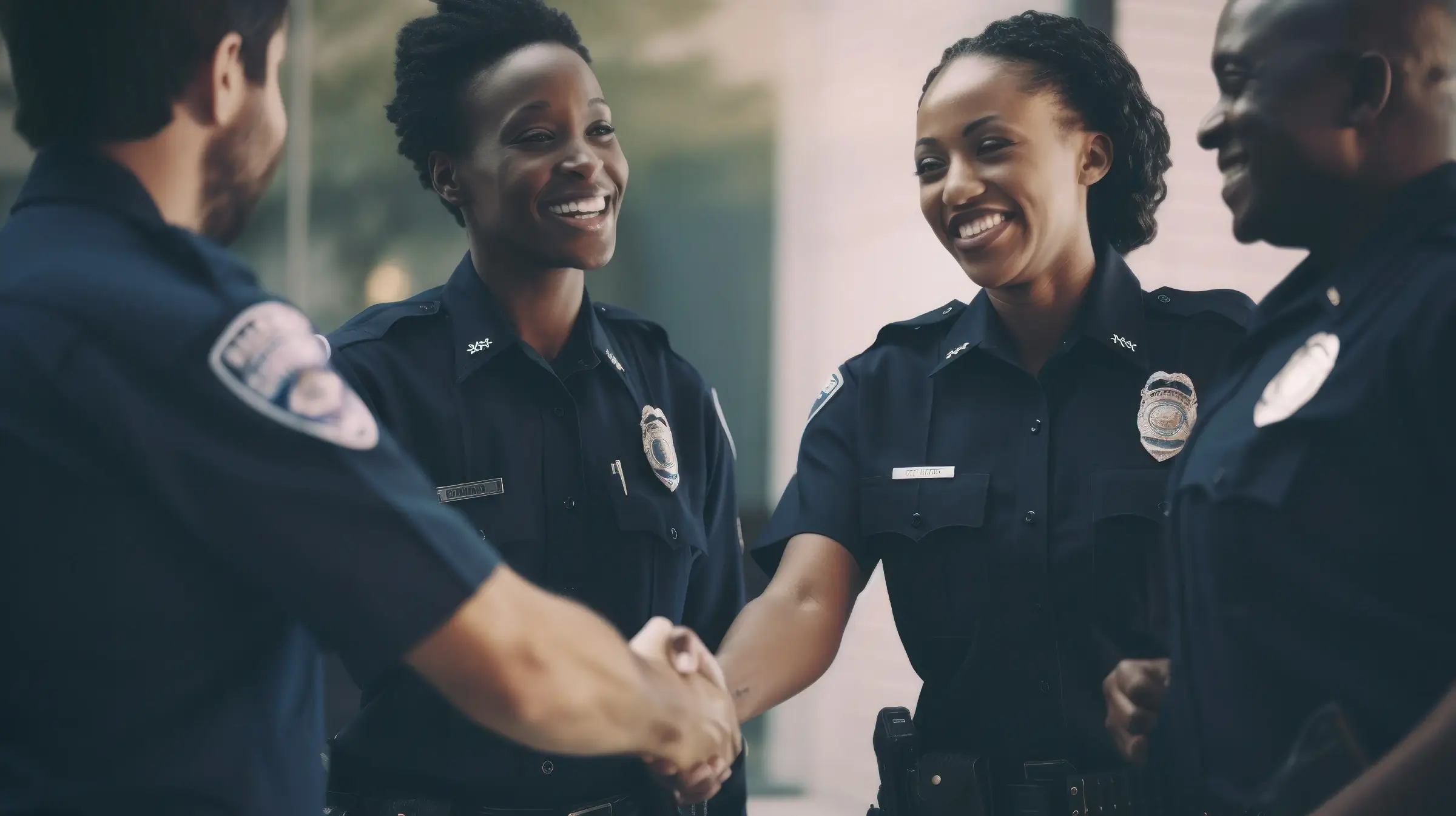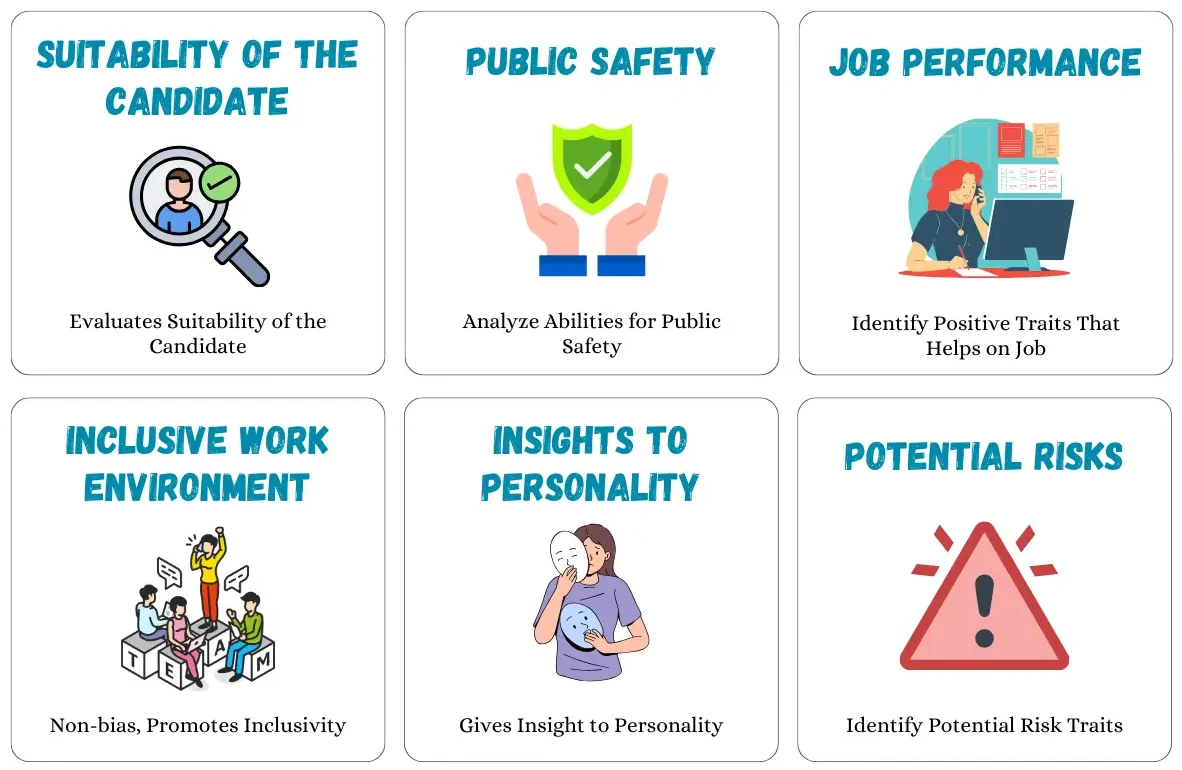Police Psych QuickPass: Psychologist-Designed Prep Course + Free Practice Test
- Overview
- Practice Test
- Curriculum
- Reviews
Embarking on a career in law enforcement requires thorough preparation, especially when it comes to the Police Psychological Exam. Our comprehensive course offers an in-depth exploration of the concepts and skills you will need to excel in this critical assessment. Developed by professionals with intimate knowledge of the police force, this course is designed to support and guide you through every aspect of the examination, ensuring that you are not only ready but confident in your abilities. Begin your journey toward success with us today.
Let’s break down what a psychological exam is and what it incorporates.

Police Psych QuickPass
Last Updated: Jul 10, 2025
Course Content
 Introduction1 StepBuy this Course: Get full access to all lessons, practice tests and guides.
Introduction1 StepBuy this Course: Get full access to all lessons, practice tests and guides. Understanding Police Psych Test1 StepBuy this Course: Get full access to all lessons, practice tests and guides.
Understanding Police Psych Test1 StepBuy this Course: Get full access to all lessons, practice tests and guides. Breaking Down the Assessment3 StepsBuy this Course: Get full access to all lessons, practice tests and guides.
Breaking Down the Assessment3 StepsBuy this Course: Get full access to all lessons, practice tests and guides. Exam Format & Timing4 StepsBuy this Course: Get full access to all lessons, practice tests and guides.
Exam Format & Timing4 StepsBuy this Course: Get full access to all lessons, practice tests and guides. Exam Tips & Strategies1 StepBuy this Course: Get full access to all lessons, practice tests and guides.
Exam Tips & Strategies1 StepBuy this Course: Get full access to all lessons, practice tests and guides. Practice Questions & Drills8 stepsBuy this Course: Get full access to all lessons, practice tests and guides.
Practice Questions & Drills8 stepsBuy this Course: Get full access to all lessons, practice tests and guides.- Quiz - Ranking - A
- Quiz - Ranking - B
- Quiz - Ranking - C
- Quiz - Best Choice
- Quiz - Most/Least
- Practice Quiz - 2 Point - True/False
- Practice Quiz - 2 Point - Yes/No
- Practice Quiz - 4 Point
- Practice Quiz - 5 Point
- Practice Quiz - 7 Point
- Practice Quiz – Work Style Questionnaire
- Practice Quiz – Life Experience Survey
- Practice Quiz – Situational Judgement Test
Understanding the Police Psychological Exam
Police psychological exam is a screening test used to evaluate various aspects of an applicant’s overall psychological well being, personality traits, decision-making abilities, problem-solving skills, emotional stability and resilience.
This test is a valuable and non-negotiable asset for employing law enforcement officers as it aims at identifying any psychological issues or personality traits that may affect an individual’s ability to perform the duties as a law enforcement officer. The test employs psychological questionnaires, interviews, situational judgment tests, and cognitive assessments to thoroughly evaluate a candidate’s personality and readiness for law enforcement roles
This test is one of the final stages in the law enforcement hiring process, following other steps like background checks, physical fitness tests, polygraph exams, and interviews.
Role of Psychological Test in Recruiting Police Officers
The Psychological test serves as a crucial filter for law enforcement agencies, ensuring that potential officers possess the resilience and aptitude necessary to manage the unique challenges and stresses of law enforcement work. By focusing on the psychological profile of candidates, this exam plays a vital role in safeguarding both officer well-being and public safety. Here is what they generally test:

Take our Free Practice Test
Police Psychological Test Process
The police psychological exam's specific procedures may differ across various police departments, but the general process typically includes:
Pre-Test Self-Evaluation
This is the preliminary stage where candidates complete questionnaires about personal history, attitudes, and emotional well-being. The information gathered provides initial insights into their self-awareness of strengths and weaknesses.
Series of Psychological Questions
Applicants take a psychological test featuring multiple-choice, true/false, or open-ended questions that assess traits like emotional stability, decision-making, stress management, problem-solving, and moral judgment. Some questions present hypothetical scenarios, while others explore past behavior and coping strategies.
Face-to-Face Interview with a Psychologist
Following the psychological questions, candidates engage in a personal interview with a licensed psychologist. This in-depth discussion delves into their background, experiences, and motivations, and it probes any psychological concerns that may have arisen earlier in the process.
Core Qualities Tested in the Police Psychological Test
The specific components being tested can vary depending on the police department or agency, but some common core qualities being tested are included in the table below:
Emotional and Interpersonal Aspects
Individual and Cognitive Aspects
Skills and Traits
Police Psych Test Format & Question Types
The Psychological Evaluation is used by many departments, though the process and the weight of results may vary. Each agency sets its own criteria to assess a candidate's mental and emotional fitness for law enforcement.
Police Psych QuickPass is designed to help you prepare for the most commonly used test formats and question types, which include:
Test Types We Cover
Here are some of the commonly used standardized tests we break down in detail to help you prepare effectively.
Response Formats We Explain
Police Psych QuickPass includes in-depth explanations of the different response formats used in police psychological exams, so you know exactly how to approach each one.
Test Duration Information
Understanding the time constraints of psychological evaluations is crucial for proper preparation and test-taking strategy. Here's what you need to know about timing.
Why Choose Police Psych QuickPass?
Don't let the psychological evaluation be the roadblock that ends your law enforcement career. Police Psych QuickPass gives you the insider knowledge and proven strategies to pass with confidence.
Master Everything
Comprehensive Content Coverage
Get full clarity on what psychologists are evaluating. Built by a trained psychologist, our course breaks down every concept and red flag into clear, coachable lessons—so you’re never guessing.
Zero Surprises
Diverse Question Formats
Train for every test format—MMPI-2, PAI, IPI-2, SJTs, and more. From 2-point to 7-point scales and lifestyle items, you’ll recognize every question type on test day.
Practice Smart
Realistic Practice Quizzes
Prep with 500+ realistic questions that mirror actual psych assessments. Get instant feedback, score breakdowns, and insights into what your answers say—and how to improve.
Ace Interviews
In-Depth Interview Guide
Use our full interview module to prep for what department psychologists actually look for. Includes question types, sample answers, practice prompts, and trait breakdowns for confidence in the room.
Insider Secrets
Targeted Tips and Strategies
Go beyond generic advice. Learn tested strategies to avoid red flags, read patterns, and present psychological fitness—exactly how successful candidates do it.
Study Anytime
24/7 Flexible Access
Prep on your schedule. Whether you’ve got two weeks or two months, get 24/7 access to every lesson, quiz, and tool—so you're always in control of your timeline.
Frequently Asked Questions (FAQ's)
In the US, both large and small police departments often use the police psychological exam into their hiring procedures. This includes municipal police departments, county sheriff’s offices, state police agencies, federal law enforcement agencies, and other specialized law enforcement units.
In Canada, similar practices are followed by various police departments and law enforcement agencies, including the Royal Canadian Mounted Police (RCMP) and municipal police services.
A failed psychological evaluation might disqualify a candidate from moving forward in the current application process. However, candidates may have opportunities to reapply or seek feedback for future improvement, depending on the policies and rules of the department.
No, there isn’t a single “ideal” profile. Evaluations focus on ensuring candidates demonstrate a range of stable and balanced characteristics suited to the demands of law enforcement roles.
Our course is specifically tailored to cover all key aspects of the psychological evaluation for law enforcement, providing thorough insights into the types of questions, evaluation formats, and strategies for showcasing your best attributes.
Definitely. The course is designed to start with foundational concepts and build up to more advanced strategies, making it suitable for beginners as well as those looking to refine their knowledge.
While we aim to familiarize you with the concepts and question patterns to enhance your knowledge and guide you into success, we cannot guarantee a specific score or selection. It depends on a multitude of factors such as department criteria, your individual characteristics and awareness etc.
No, there is no set pattern of questions or questionnaires asked in a psychological exam that you can familiarize yourself with. While many departments use psychological exams to assess the candidate before hiring, the specific details, questions and weight given to answer vary from one department to another. Before applying, research and get all the information you can get from the department you are applying for.
Our course not only offers an in-depth explanation of the content but also provides hundreds of personality- related questions, giving you an opportunity to think about your strengths, weaknesses and behavioral patterns. We include information about the expected question patterns and traits that may be assessed. Moreover, our practice quizzes give a golden opportunity for you to think like a law enforcement officer.

Created by: Tanoo Purohit
MSc - Clinical Psychology, Psychometric Tutor, Prepterminal Test Expert
460 students, 4.4, 87 Reviews
I’m Tanoo Purohit, with a BA honors and an MSc in Clinical Psychology from the renowned National Forensic Sciences University. Over seven years, I’ve studied the intricacies of the human psyche (as a part of my curriculum and practice). Proudly associated with PrepTerminal, I serve as a Psychometric Course Author and am recognized as a Psychological Test Expert. In every course I craft, I merge my expansive knowledge with relatable insights, ensuring that complex psychological concepts are presented with clarity and resonance for all learners. Feel free to contact me at [email protected].
